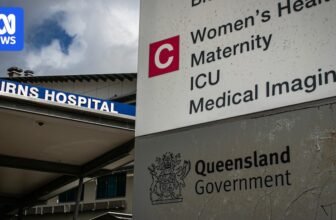Federal vaccine guidance got you confused? You’re not alone.
By Anne Blythe and Lola Oliverio
Amid all the chaos and confusion emanating from the Centers for Disease Control and Prevention these days about vaccines, Christoph Diasio, a Southern Pines pediatrician, is well aware of the impact that such tumult can cause closer to home.
At Sandhills Pediatrics, where he’s practiced medicine for 17 years, parents bringing their children to the Moore County health care facility are anxious and confused, he said. It’s not because of an increase in vaccine skepticism either.
“They’re frustrated. They’re worried because they think they’re not going to be able to get the vaccines,” Diasio said.
Since Robert F. Kennedy Jr., one of the country’s best known vaccine skeptics, became the U.S. Secretary of Health and Human Services, there has been a growing fear of what many public health advocates describe as an attempt to undermine established vaccine science.
Six eminent medical organizations, including the American Academy of Pediatrics and American College of Physicians, said as much in a lawsuit filed in July, a little more than a month after Kennedy announced in a social media post that the CDC’s recommended immunization schedule no longer included COVID vaccines for healthy children and healthy pregnant women.
“Unless the Secretary’s baseless and uninformed policy decision is vacated, pregnant women, their unborn children, and, in fact, all children remain at grave and immediate risk of contracting a preventable disease,” the lawsuit contends. “This decision immediately exposes these vulnerable populations to a serious illness with potentially irreversible long-term effects and, in some cases, death. This is not a hypothetical concern, but a pressing public health emergency that demands immediate legal action and correction.”
Awaiting ACIP
Typically, such a directive from the HHS head would not have been issued without rigorous scientific research and review by the CDC’s Advisory Committee on Immunization Practice, or ACIP. Kennedy, however, bypassed that protocol. Flanked by Jay Bhattacharya, the National Institutes of Health director, and Marty Makary, commissioner of the Food and Drug Administration, Kennedy said in his social media post that he “couldn’t be more pleased” to announce the change.
Nearly two weeks after Kennedy issued that directive, he fired all 17 members of the vaccine advisory committee, falsely claiming they had conflicts of interest. He has replaced them with his own appointments — many who have been vaccine critics and some who have been accused of having conflicts of interest, such as being a paid witness in a lawsuit against Merck, a vaccine company.
The new panel is scheduled to meet Sept. 18 and 19, and many public health advocates are waiting to see what comes from the first meeting since Kennedy fired CDC director Susan Monarez.
That could provide more clarity on how accessible COVID vaccines will be over the coming year, as well as whether there will be new recommendations for hepatitis B and RSV vaccines.
COVID booster changes

Now that rates of COVID are ticking up, patients across North Carolina have been walking into pharmacies to get a shot — only to find signs like one recently posted in a Charlotte Walgreens: “Please note that per NORTH CAROLINA GUIDELINES, ANYONE 18 years and older will need a prescription in order to receive a COVID-19 VACCINE.”
In late August, the Food and Drug Administration approved an updated COVID-19 booster vaccine to target the newer strains of the virus, but when doing so the agency removed emergency use authorization for them. Now those shots, according to the agency’s recommendation, are available for all people 65 and older or for anybody 6 months and older with at least one high-risk condition — such as asthma, obesity, diabetes and pregnancy, among many others. By law, according to a statement the state Department of Health and Human Services emailed to NC Health News, pharmacists in North Carolina follow ACIP guidelines.
So, without the emergency authorization, people who don’t meet the criteria have to prove they “need” the shots by providing a prescription.
That’s even though North Carolina has seen a sharp increase this month in COVID detected in wastewater, according to the state Department of Health and Human Services. The viral activity statewide was 12.2 for the most recent week, which is “very high,” compared with a “low” rate of 3.1 in the week of Aug. 16, according to the DHHS wastewater monitor dashboard.
While some of the current obstacles might lessen as more vaccine is distributed, the confusion about what the federal vaccine guidelines are currently — and what they will be after the vaccine advisory committee meets next week — is generating questions on par with those in 2020 when the first vaccines were rolled out during the pandemic.
Doug Drew, a 69-year-old Charlotte resident, encountered the sign at the Charlotte Walgreen’s when he went for a vaccine appointment he had signed up for online. Once there, he was told he would need a prescription to get a shot. Ultimately, he was able to get his health care provider to call in a prescription, but he was frustrated.
“A lot of people, including me, are confused about who can and can’t get a COVID vaccine,” Drew told NC Health News.
North Carolina state health officials are “closely monitoring for changes in federal recommendations for COVID vaccines,” according to a DHHS statement emailed to NC Health News on Sept. 4, while also remaining “committed to ensuring that all North Carolinians have access to vaccinations.”
As of Sept. 12, to receive a COVID-19 vaccine in North Carolina, one needs:
- To be 65 or older
- Or be older than 6 months and have a preexisting condition that qualifies you for a vaccine.
- Or to have a prescription from their health care provider.
Some states, such as California, Washington, Oregon, Massachusetts and New York, have been carving paths of their own to create vaccine policy for their residents amid the federal uncertainty. North Carolina public health officials are closely monitoring the situation, DHHS told NC Health News.
“Vaccines remain an important part of overall health and well-being and are one of the most effective means available to prevent serious illness,” according to the DHHS statement. “Vaccinations against seasonal respiratory viruses, including flu, RSV, and COVID-19, are especially important for those at higher risk of severe viral respiratory disease.“
Measles, whooping cough cases
In August, as many parents were getting ready to send their children back to school, Kelly Kimple, director of the state DHHS division of Public Health, spoke with NC Health News about a new Childhood Vaccines Toolkit launched this summer to help health care providers and families start a conversation about childhood vaccines.
“The toolkit was really based on research that we did in North Carolina, and acknowledging that, you know, this is how we can work together to ensure that we build trust and work with families to ensure that they have information about vaccines,” Kimple said. “The science continues to be clear on vaccines, and that vaccines are safe and effective and save lives.”
Across the country, though, anti-vaccine rhetoric has gotten louder in recent years. The pandemic brought initial skepticism about COVID vaccines, although the stances of many naysayers have since evolved. For example, Florida Surgeon General Joseph Ladapo, has announced plans to do away with all vaccine mandates, including those for school children.
And whether it’s because of vaccine skepticism or health care access barriers, low rates of vaccination can lead to disease outbreaks in vulnerable communities, such as what happened in Texas earlier this year with a widespread measles outbreak that led to the deaths of two children, who were not vaccinated and had no known underlying conditions, their state health department said, and the hospitalization of 99 people. One adult across the border in New Mexico died, according to the New Mexico Department of Health.
North Carolina saw its first confirmed measles case of the year in late June after a child became ill while traveling to Guilford and Forsyth counties from another country where measles outbreaks had been reported, according to the DHHS Division of Public Health.
State law requires all students to be vaccinated against several illnesses — including measles — to attend public school, unless they receive specific exemptions for medical or religious purposes.
For the 2023-24 school year, 93.8 percent of the state’s kindergartners were vaccinated against measles, but state health officials would like to see that number closer to the 95 percent threshold needed to achieve herd immunity.
They also have concerns about whooping cough, or pertussis, which has been more prevalent in this state over the past year than in the previous 70 years, according to public health officials.
The state has launched several new initiatives to ensure that vaccines are accessible for everyone throughout the state, including a Vaccines for Children Program to help eligible citizens get their children vaccinated at no charge.
Looking for information about childhood vaccines? Try these sources:
Want specifics about COVID, RSV and flu vaccines? Try here for updates from the state Department of Health and Human Services.
Filtering the ‘noise’
At Sandhills Pediatrics, Diasio says he generally finds parents supportive of the childhood vaccines. Sometimes parents will have questions. Answering them and letting people know where they can get reliable information is core to the practice of pediatrics. “We’re on the same side,” Diasio said. “We’re trying to do the best thing for their child.”
While the political rhetoric over vaccines troubles Diasio, he said it also intrigues him. “It’s fascinating to me, just politically,” he said, noting the support among his patients for vaccinations. “It doesn’t seem like a good thing for a politician. I don’t understand why there’s a conversation or debate about this.”
Cedric Bright, a North Carolina physician who has been practicing medicine for decades in Greenville, said he has been seeing concern among adult patients who are worried about the availability of vaccines amid the mixed messages from federal officials. Similar to what’s happening at pediatric offices across the state, Bright said it’s important to engage with patients who have questions.
“We just have to just separate the noise from the truth,” Bright said.
Then he helps them think logically about vaccines, the history of their efficacy and compare that to the rhetoric. Those conversations are important to have with health care providers, he said.
“Those generating the noise, you have to wonder if they’re having a discussion with their health care provider,” Bright said.
Republish our articles for free, online or in print, under a Creative Commons license.














